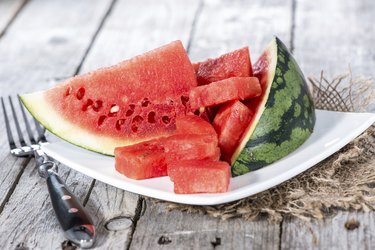
Detox diets come in many variations — the lemonade diet, grapefruit diet and broccoli diet — and are typically based on eating nothing but specific juices, raw fruits or vegetables for a few days. The watermelon diet is much the same.
The diet plan requires eating nothing but watermelon for up to 10 days at a time. And proponents of the watermelon fast tout the so-called cleanse for its weight-loss effects.
Video of the Day
Video of the Day
But this — or any diet — that encourages you to only eat a single food can be dangerous because it doesn't provide enough calories or nutrition, per the National Center for Complementary and Integrative Health.
In reality, the watermelon diet plan won't necessarily help you shed pounds. In fact, this (or other crash weight-loss diet) often results in weight regain, according to the Mayo Clinic.
With that in mind, here's everything you need to know about watermelon dieting, plus safer alternatives if weight loss is your goal.
Tip
If you're considering watermelon fasting, talk to your doctor to find a safer, more sustainable alternative that better addresses your health needs in the long run.
What Is the Watermelon Diet?
The watermelon diet is promoted as a detox plan that cleanses your body and aids in weight loss.
Those watermelon fast benefits might sound good, but there's a catch. While there are various versions of the cleanse, most involve eating nothing but watermelon for days on end — for instance, trendy options include the one-day watermelon detox and three-day watermelon fast.
Does the Watermelon Diet Work for Weight Loss?
Just like the pineapple diet or the cantaloupe diet, this supposedly slimming plan is low in calories and lacks variety. Put simply, it's a crash diet that limits your food choices and can take a toll on your health.
While a watermelon cleanse may promote weight loss in the short term due to dangerous calorie restriction, this is only temporary. According to the Cleveland Clinic, rapid weight loss causes your metabolism to slow down, making it harder for your body to burn calories and encouraging weight regain once the diet ends.
What's more, shedding pounds too fast means you're burning muscle mass instead of fat, which likewise decreases your body's long-term strength and calorie-burning ability, per the Cleveland Clinic. In other words, you'll gain back any weight you lose on the watermelon detox at the expense of your wellbeing.
According to the Cleveland Clinic, fast weight loss — like what the watermelon fast diet promises — can also harm your health by depriving your body of essential nutrients, which can lead to the following problems:
- Digestive problems like constipation
- Fatigue and loss of energy
- Loss of bone density and strength
- Decreased immune function
- Hair loss
And those aren't the only risks — according to a small 2018 study in the European Society of Cardiology, crash diets may may affect cardiovascular function and worsen existing heart problems. People who followed a diet providing only 600 to 800 calories per day experienced a 44 percent increase in heart fat levels after just one week.
What's more, the watermelon detox excludes fat and protein, both of which are essential for providing energy and repairing tissue, according to the National Institute on Aging. Without these nutrients, you can experience issues like muscle breakdown, fatigue and headaches.
The takeaway: Do not try the watermelon diet for any reason. Not only will it not help you lose weight in the long term, but it could damage your health.
Watermelon Benefits and Nutrition Facts
If your love for watermelon is what attracted you to the idea of a detox with watermelon in the first place, luckily, the fruit still has its place in a safe, balanced diet.
Per the USDA, the nutritional content of a 1-cup serving includes:
- 46 calories
- 1 g protein
- 12 g carbs
- 0.2 g fat
- 0.6 g fiber
- 9 g sugar
Plus, it's rich in vitamins and is also a good source of l-arginine, l-citrulline and various antioxidants that may help decrease post-exercise inflammation and boost immune function, according to a 2016 review in Nutrients.
Watermelon may benefit your heart, too. A July 2014 study in the American Journal of Hypertension found that this fruit may reduce cardiac stress and aortic blood pressure in adults with obesity.
Lycopene, one of the most abundant antioxidants in watermelon, may also lower your risk of diabetes and heart disease, per June 2014 research in Europe PMC.
How Much of the Weight of Watermelon Is Water?
About 90 percent of watermelon is water, per the USDA. That's why the fruit is so low in calories and also able to fill you up.
Alternatives to the Watermelon Diet
Instead of following a crash diet like the watermelon flush, making tweaks to your lifestyle is the best way to lose weight safely and sustainably.
According to the Mayo Clinic, this means losing weight at the expert-recommended pace of 1 to 2 pounds per week through a combination of eating a balanced diet and exercising regularly.
A nutritious diet generally includes the following foods:
- Fruit
- Vegetables
- Legumes like lentils, peas and beans
- Whole grains like spelt, buckwheat and oatmeal
- Beneficial fats like avocados, seeds and olive oil
- Lean proteins like fish, poultry and nuts
In terms of exercise, the Physical Activity Guidelines for Americans recommend adults get 150 to 300 minutes of moderate-intensity cardio exercise per week, plus two strength training sessions.
In addition to eating a balanced diet and regular activity, you should also drink plenty of water, get enough sleep and visit your health care provider annually for a physical, according to Harvard Health Publishing.
Try These Nutritious Recipes With Watermelon
- European Society of Cardiology: "Crash Diets Can Cause Transient Deterioration in Heart Function"
- Nutrients: "Comparison of Watermelon and Carbohydrate Beverage on Exercise-Induced Alterations in Systemic Inflammation, Immune Dysfunction, and Plasma Antioxidant Capacity"
- American Journal of Hypertension: "Effects of Watermelon Supplementation on Aortic Hemodynamic Responses to the Cold Pressor Test in Obese Hypertensive Adults"
- National Center for Complementary and Integrative Health: "“Detoxes” and “Cleanses”: What You Need To Know"
- Cleveland Clinic: "Is It Bad to Lose Weight Too Quickly?"
- Europe PMC: "Watermelon lycopene and allied health claims."
- U.S. Department of Health and Human Services: "Physical Activity Guidelines for Americans"
- Mayo Clinic: "Weight loss: Choosing a diet that's right for you"
- National Institute on Aging: "Healthy Eating As You Age: Know Your Food Groups"
- Mayo Clinic: "Weight loss: 6 strategies for success"
- Harvard Health Publishing: "The dubious practice of detox"
- U.S. Department of Health and Human Services: "Watermelon, raw"


